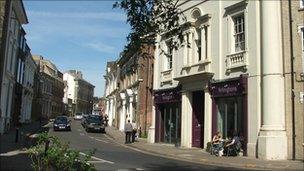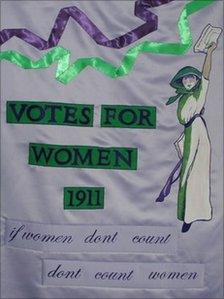Suffragettes' 1911 census boycott celebrated in Ipswich
- Published

The building on Museum Street, Ipswich is now a restaurant
A celebration of the centenary of a suffragette boycott of the census is to be held in Ipswich.
About 30 votes-for-women campaigners spent the night of 2 April 1911 in an office at the Old Museum Rooms to avoid filling in the forms.
Their slogan was "If I am intelligent enough to fill in this form, I can surely put an X on a ballot paper".
A night marking the protest is being held in the building in Museum Street, which is now a restaurant, on Sunday.
The women's suffrage campaign had been going for about 40 years but by 1911 there had been no change in voting laws.
Joy Bounds, the organiser of the 2011 event, said: "For a few years suffragettes had been getting angrier and there were enormous demonstrations, women would go to prison, hunger strike and they'd be force-fed which was a very brutal experience.
"They wanted to do something that would have an impact on the government, but wouldn't be very difficult for the women to do."

A banner has been made for the 2011 centenary event
'Passive resistance'
The building had become offices following Ipswich Museum's move to the High Street.
It is believed some of the protesters' husbands guarded the door while the women had supper, sang protest songs and talked about the movement until dawn.
Dr Jill Liddington, suffrage historian at the University of Leeds, said: "It was fairly typical of the type of boycott action taking place across England.
"It was influenced by the tactics of Gandhi - passive resistance to a non-democratic state."
No women were ever charged with breaking the law for refusing to fill in the census.
The census boycotts gained publicity but did not lead to an immediate change in the law.
Women over the age of 30 were given the vote in 1918 and the age was lowered to 21 to achieve equality with men in 1928.
Organisers of the celebration hope it will remind people of the campaign - particularly those who do not use their vote.
Ms Bounds said: "Both men and women who were without much money or property had to fight to get the vote, so my view is that everybody should use it.
"Nowadays everybody has the choice whereas in those days no woman had that choice."